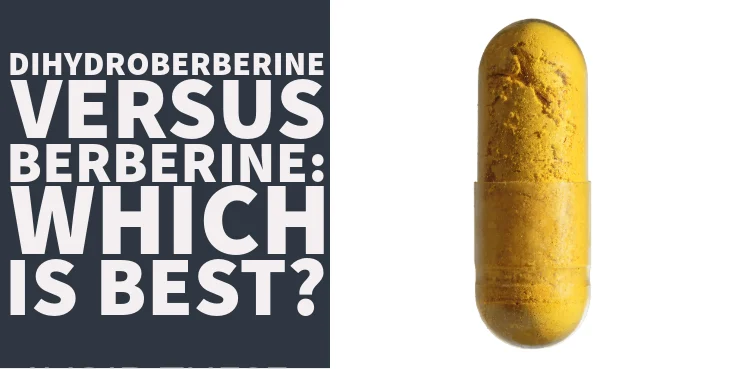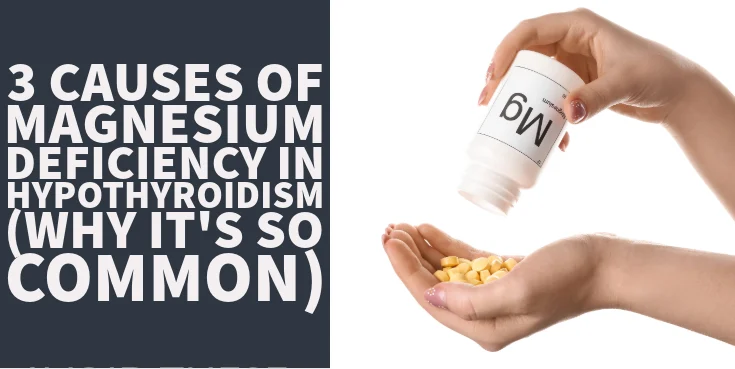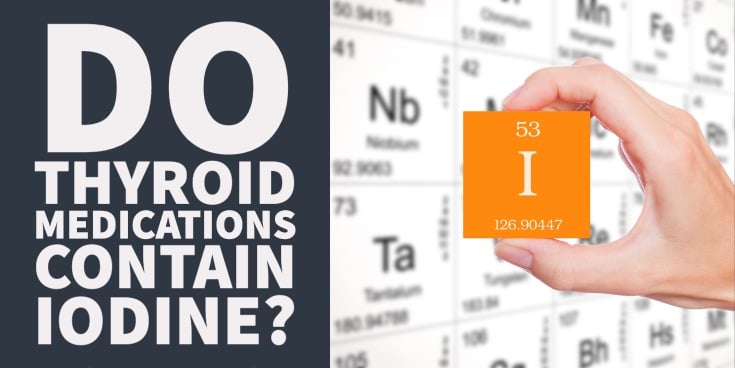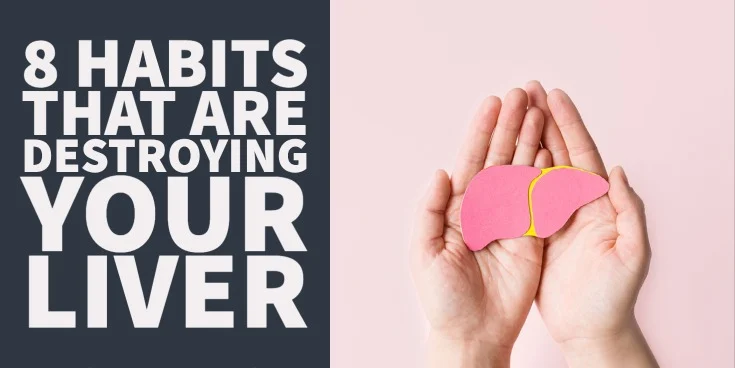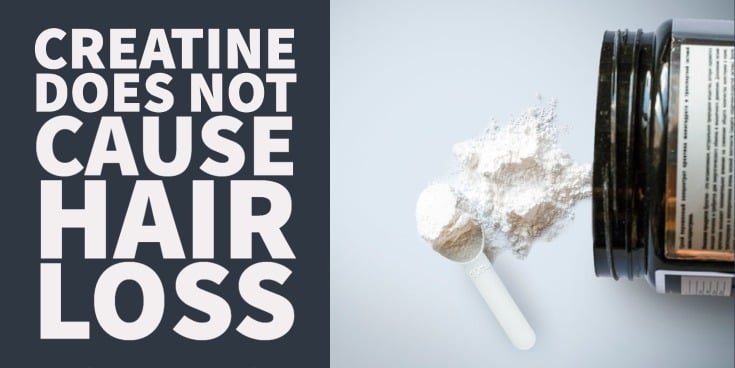Leaky gut results in systemic damage that influences multiple systems in your body.
Because of this damage, you may experience symptoms ranging from depression to chronic constipation and much more.
The key to diagnosing leaky gut is understanding exactly how your gut interacts with hormone systems and neurotransmitters in your body.
Then you can understand how to treat the problem.
Let’s discuss the most common leaky gut symptoms and how to treat them:
What is leaky gut?
By now there’s no doubt you’ve at least heard about leaky gut.
But what is leaky gut and why does it matter to your health?
In simple terms, a leaky gut is defined as damage that occurs to your intestinal lining which allows bad things to enter your bloodstream and prevents good things from being absorbed.
This is obviously an oversimplification, but it gives you an idea of why leaky gut is so important.
Damage to the intestinal lining results in the absorption of pro-inflammatory cytokines which can interact with your brain and skin causing all sorts of problems for your immune system and thyroid function.
If you suspect or know you have thyroid problems there is a HUGE probability that you also have some degree of intestinal damage.
You can identify the presence of leaky gut using this list of symptoms and risk factors: (we will go into detail on HOW these symptoms develop as well):
- History of autoimmune disease
- Mood changes like depression, irritability, or anxiety
- Poor immune system
- Nutrient deficiencies
- History of antibiotic use as a child
- Chronic abdominal symptoms (gas, bloating, constipation, diarrhea)
- Dermatitis, Eczema, Rosacea, or Rashes
- Chronic fatigue or a history of chronic fatigue syndrome
- History of thyroid disease
- Diagnosis of Hashimoto’s thyroiditis
- Digestive issues
- History of acid reflux
- History of SIBO/SIFO
- Functional abdominal pain
- Brain fog
- Trouble concentrating
- Cravings for salt/sugar or unhealthy foods
The more symptoms and risk factors that you have the more likely you are to have a diagnosis of leaky gut.
Top 10 Symptoms that indicate you may have leaky gut
One of the things you may have noticed is that many symptoms of leaky gut occur OUTSIDE of the intestinal tract.
These symptoms are known as “extra-intestinal” symptoms.
And it is these symptoms that can make the diagnosis so difficult.
Why?
Because most conventional physicians will not link your recurrent or chronic depression to your intestinal tract – even though the studies have suggested there is a clear link between the two (1).
This puts you as the patient at a disadvantage when it comes to diagnosis.
For this reason, it is critical that you have an understanding of why these symptoms occur and also how to go about with treatment.
Below I’ve included a brief rundown of what causes each symptom including relevant literary links to support the claims.
#1. History of Autoimmune Diseases (Hashimoto’s thyroiditis, Rheumatoid arthritis, psoriasis, celiac disease, etc.)
Autoimmune disease results in tissue damage in your own body from dysregulated immune function.
In a nutshell, this means that your own body (from your immune system) is attacking and destroying itself.
This process can occur in basically any tissue in your body ranging from your thyroid gland (Hashimoto’s) to your joints (rheumatoid arthritis).
Autoimmune disease as a condition is also increasingly becoming more and more common – which is a concern for many patients.
What’s interesting is that there is a clear link between intestinal function, immune function, and the development of autoimmune disease.
There are many ways that this occurs but one such method is known as molecular mimicry.
In this condition, your body absorbs harmful portions of bacteria or toxins that then look similar to your own tissues.
Your immune system creates antibodies to these particles and then these antibodies cross-react with both the foreign invader and also certain tissues in your body.
We know that this condition appears more frequently in individuals with “leaky gut” as the intestinal membrane is designed to keep these materials out (2).
Reversing this process and healing the intestinal membrane may be one way to combat autoimmune disease.
#2. Known thyroid dysfunction (diagnosis of hypothyroidism) or other hormone imbalances (estrogen dominance, low progesterone, etc.)
Your gut is a source of thyroid conversion and up to 20% of T4 is converted to T3 (3).
This has huge implications for the thyroid status in your entire body.
Why?
Because damage to the gut may result in a reduction in this peripheral conversion and therefore a reduction in free T3 and total T3 levels in the body.
In addition, intestinal damage may result in an increased incidence of developing Hashimoto’s thyroiditis (4) which is an autoimmune disease.
Hashimoto’s results in direct damage to the thyroid gland from antibodies.
Over time, if not treated or controlled, this damage may result in the diagnosis of hypothyroidism (or low thyroid function).
#3. History of depression or mood disorders
Intestinal inflammation, as is seen in leaky gut, may also result in a series of events that results in neuroinflammation and therefore symptoms such as depression, anxiety, or irritability.
This seems to occur as a result of the absorption of intestinal bacteria from damage to the epithelial membrane meant to keep these bacteria out (5).
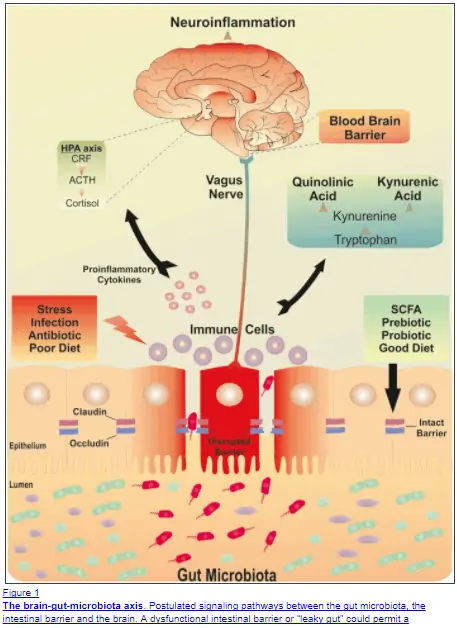
Once these bacteria enter your bloodstream they then start a cascade of events that result in changes to neurotransmitter levels and inflammation that can pass the blood-brain barrier.
The good news is that treating this inflammatory cascade can reverse the damage and reverse neurological and psychiatric symptoms.
#4. Poor immune system or history of frequent illness
Your intestinal lining acts as a barrier but also as a learning tool for your immune system (6).
In the intestinal tract, your body comes into contact with all sorts of chemicals, foods, toxins, bacteria, and anything else you put in your mouth.
Here it must learn which of these foods is good, which is bad, and how to discard the rest.
When you damage your intestinal lining (which is the definition of leaky gut) this education system becomes less efficient.
It results in poor education of your immune system and may trigger autoimmune disease and other changes to the immune system.
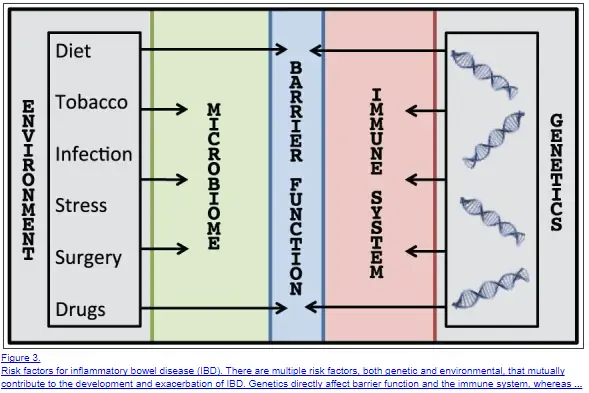
In addition, people with intestinal issues also frequently get sick and the illnesses that they get tend to last longer.
#5. Multiple known or suspected nutrient deficiencies
This one is pretty straightforward:
Your intestinal lining is the place where all food, nutrients, hormones and pretty much anything else is absorbed
If there is local damage to the intestinal tract your body will become less efficient in absorbing critical nutrients and vitamins.
In addition, changes to your intestinal tract alter the intestinal pH which further reduces the absorption of certain vitamins and nutrients.
Leaky gut frequently results in nutrient deficiencies such as zinc, vitamin B12, and iron (7).
#6. Trouble with digesting certain foods or pain after meals
This symptom has more to do with intestinal bacterial concentration than anything else.
Remember that it is the combination of bacteria AND pancreatic enzymes which break down food and help with absorption.
If there is dysfunction in either of these symptoms it may alter how your body reacts to the food that you eat and how you digest it.
This reaction results in food “interolance” or food allergies (8).
With this condition, you may react negatively to certain foods that you never had a problem with in the past.
The good news is that treating leaky gut will improve how you tolerate certain foods.
#7. Chronic abdominal symptoms such as gas, bloating, constipation or diarrhea
Many of these intestinal symptoms result from a combination of small intestinal bacterial overgrowth, and small intestinal fungal overgrowth of intestinal dysbiosis.
All of these conditions refer to changes in the bacteria or fungal concentration in your gut.
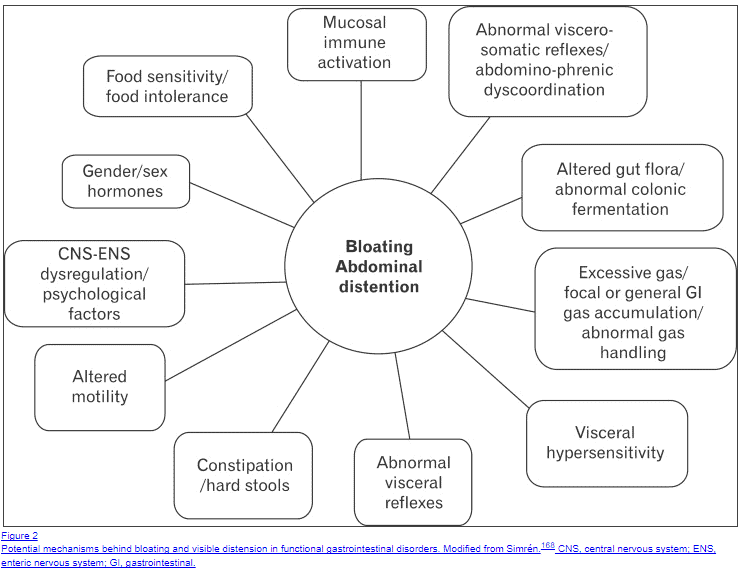
Gas and bloating are usually caused by how your body digests food, but it may also be due to vagal interaction in the GI tract as well.
Constipation and diarrhea are well known to be associated with certain types of bacteria in the gut (9).
#8. Brain fog, trouble concentrating, ADD/ADHD or anxiety
Neurological symptoms occur through the complex interaction between the gut, serotonin levels, and inflammation.
It has been shown that the gut is a huge source of serotonin (10) (more so than the brain) and changes to certain bacteria alter serotonin and other neurotransmitter levels.
This may explain the connection between brain-related changes and leaky gut
#9. Skin issues such as dermatitis, rashes, eczema or rosacea
Certain bacterial concentrations in the gut release cytokines that can be absorbed systemically.
These cytokines then react once they hit target tissues.
Certain bacteria cause changes that specifically target dermal/epidermal cells and result in inflammation in the skin.

This inflammation may result in dermatitis (of unknown etiology) (11), rosacea, random rashes, or eczema.
#10. Food cravings – especially for sugar, carbs or unhealthy foods
The food that you consume contributes to the concentration and bacterial species that grow in your gut.
The trick here is that once certain bacterial populations grow to a critical point, they start to secrete cytokines and other chemicals which trigger food cravings in your brain (12).
This is how unhealthy food may result in cravings for MORE unhealthy food.
Why?
Because the bacteria in your gut FEED off of the unhealthy food and they know that they will die if you don’t keep eating it.
This connection results in strange food cravings that may be designed to help sustain bacterial species.
Your Thyroid & Your Gut
There is a special and important connection between hypothyroidism and leaky gut that is worth discussing.
If you are a patient with known hypothyroidism, and you are keeping track, you’ll probably find that you have at least 2+ of the symptoms listed above.
Why?
Because thyroid function alters the intestinal function and vice versa.
The relationship between your thyroid and your gut is similar to the adrenal/thyroid connection – as one hormone becomes dysregulated it will drag down the other.
And just like that connection, fixing this problem requires treatments for each individual system.
This means that in addition to treating your leaky gut you will also want to take targeted steps to help improve your thyroid function.
How leaky gut impairs thyroid function:
- Gut dysfunction reduces peripheral thyroid conversion and directly LOWERS free T3 levels. Around 20% of T4 in your body is converted in the gut (13) meaning it’s an important source for thyroid conversion next to your liver.
- Leaky gut may reduce thyroid hormone ABSORPTION making your thyroid hormone less effective.
- Leaky gut causes multiple nutrient deficiencies (especially iron (14), zinc, and selenium) which all help thyroid hormone to function cellularly.
- Leaky gut may increase thyroid autoantibodies and cause glandular damage (15) (permanent if not treated) and worsen thyroid function long term.
- Symptoms of leaky gut may mimic the symptoms of hypothyroidism which clouds the picture and makes treating your thyroid more complicated.
This connection between hypothyroidism and leaky gut is partly responsible for weight gain that can occur in patients with increased intestinal permeability.
Remember:
Your thyroid controls your metabolism and any damage to your thyroid will result in damage to your metabolism.
The best way to treat this problem is by treating the root cause:
What to do about leaky gut?
Now that you know WHAT leaky gut is and WHY it’s important, we can talk about how to go about treating it.
I’ve put together a 4 step guide to help you get started but realize you may need a more individualized approach depending on your situation.
Step #1. Add/Remove foods from your diet.
The first step you want to take is to change or alter your diet. Certain foods can be very damaging to your intestinal tract just like some foods can be very nourishing.
The goal here is that you want to REMOVE the bad foods and ADD in the good foods.
One final thought:
You don’t necessarily need to consume the good foods forever, once you heal your intestinal lining you should be able to reduce the frequency of these foods (because some are not necessarily easy to consume/make).
Foods to AVOID:
- Refined sugars
- Grains/gluten
- Processed foods and foods with preservatives or additives
- Xenoestrogens and endocrine disruptors
- Hormones from foods (nonorganic milk, etc.)
- Beans and legumes
Foods to EAT:
- Fermented foods (slowly) such as kefir, kombucha, sauerkraut, etc.
- Coconut oil (and other healthy saturated fats)
- Fermented vegetables
- Raw cultured dairy
- Bone broth
Following these guidelines for at least 3-6 months should result in an improvement in your intestinal lining.
Step #2. Take probiotics and prebiotics.
Next on the list is the addition of both probiotics and prebiotics (16).
Probiotics can help rapidly heal the intestinal lining and reverse the symptoms of a leaky gut.
Probiotics help by increasing the growth of healthy and beneficial bacteria while limiting the growth of negative bacteria.
Probiotics also bind to toxins and cytokines that cause autoimmune disease, depression, and changes to your appetite.
One of the best things about using probiotics for leaky gut is that they work fairly rapidly (most people notice a difference within 1 week).
The trick here is getting the best and most high-quality probiotics. What this means for you is the following:
- Probiotics that are multistrain and multispecies.
- High-dose probiotics (greater than 100 billion CFU per serving).
- Probiotics that are climate and temperature controlled.
- Probiotics that contain BOTH bifidobacterium and lactobacilli species.
You will want to use probiotics frequently (daily to every other day) for at least 2-3 months. Once you achieve intestinal repair you can reduce your dose down to a maintenance dose of 1-2x per week.
You can find a high-potency, multi-species/strain probiotic that I recommend here.
Step #3. Use supplements to nourish and repair your intestinal lining.
In addition to using probiotics, there are also several other supplements that can be used to increase healing and reduce the symptoms of a leaky gut.
Other supplements that can help heal leaky gut include:
L-glutamine –> Directly helps heal the intestinal lining and nourishes the GI tract.
Digestive enzymes –> Helps increase nutrient absorption and reduce the burden on the pancreas for breaking down foods (this makes digestion easier for your body).
DGL (licorice root) –> Licorice root helps to directly balance immune function and restore structural integrity to your intestinal lining.
Quercetin –> Very powerful anti-inflammatory agent that also helps boost immune function (which is helpful for people with leaky gut AND autoimmune disease).
Please note this is not a comprehensive list of supplements that can be used to heal your GI tract but it’s a good starting point.
Other supplements can be added as necessary.
You don’t necessarily need to use all of these supplements but I do recommend that at the minimum you combine both probiotics WITH L-glutamine.
Step #4. Test and treat other intestinal issues if present.
Lastly, you will need to be assessed (and treated) for conditions that tend to accompany leaky gut.
These conditions CAUSE leaky gut but are not treated by the standard treatment recommendations above.
The following conditions can potentiate and make leaky gut difficult to treat:
- Intestinal dysbiosis (too much bad bacteria relative to healthy bacteria)
- Small intestinal fungal overgrowth which is also known as SIFO or yeast overgrowth (17)
- Small intestinal bacterial overgrowth which is also known as SIBO
They are mentioned here because they are commonly missed by providers and patients and may be the cause of longstanding or treatment-resistant leaky gut in many patients.
Back to you
Bottom line?
Leaky gut may cause both extraintestinal and direct intestinal symptoms due to the complex interactions of your gut bacteria and your body.
These symptoms may be commonly missed by general practitioners which may require you to gain advanced knowledge of the interaction between your intestinal tract and your body.
Treating leaky gut will require a multifaceted approach including changes to your diet, the addition of targeted supplements, and the treatment of other existing intestinal pathologies.
Now I want to hear from you:
Do you have the symptoms of a leaky gut? If so, how many are you currently experiencing?
Have you tried treatment yet? Did it work for you?
Leave your comments below!


